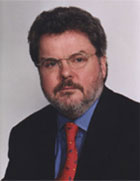December 6, 2005
FeatureFCC Vs. CPB
The Broadcasting Showdown
Warning! The following article is a blatant example of the supposedly pervasive liberal bias in American media.
Hello, America, and welcome to "Which National Agency is the Bigger Asshole?" I'm your host, M. Brianna Stallings, and we've got quite a show for you this week.
Both contestants hail from this country's pinnacle of virtue and incorruptibility, Washington D.C. Contestant #1 is a nosy old biddy just a few years shy of decrepit whose hobbies include telling people how to think and slapping foul-mouthed rapscallions with heavy fines when they dare say something "offensive". Ladies and gentlemen, please welcome an old favorite back to the show — The Federal Communications Commission (FCC)!
Contestant #2 is a newcomer to this program. A young upstart with some crazy ideas about creating an educated populace, this contestant has had a pretty decent track record until recently. Here it is... that tireless government non-profit organization, The Corporation for Public Broadcasting (CPB)!
Well folks, it's been a tough year for both of our beloved agencies, so in order to determine which one will win the coveted title of "Bigger Asshole", let's take a look at some of the issues each agency is bringing to the table.
 Thanks a bunch, Janet |
The FCC starts out with a doozy: HR 310, or the Broadcast Decency Enforcement Act of 2005. The bill asks "to increase the penalties for violations by television and radio broadcasters of the prohibitions against transmission of obscene, indecent, and profane material, and for other purposes." Since Janet Jackson's infamous wardrobe malfunction during the 2004 Super Bowl half-time show, indecency complaints and FCC fines have skyrocketed. As a result, the House has overwhelmingly voted twice to increase — from $11,000 to $500,000 for an individual entertainer, and from $32,500 to $500,000 for broadcasters — the fine the FCC can levy for each instance of "indecency."
The Broadcast Decency Enforcement Act of 2005 would remove an FCC provision that gave individuals any warning before issuing a fine. Although still pending before the Senate Commerce Committee at this time, HR 310 received the thumbs-up from the House in February, and as of this time, appears to still be awaiting approval from the Senate. Those wacky do-gooders, The American Civil Liberties Union (ACLU), even sent a letter to the House of Representatives pleading that, based on the already vague government definition of "indecency", they had decided against voting Yes on HR 310. No luck, liberals!
1b. CPB: Tomlinson's Anti-"Liberal Media" Brigade
Speaking of those loony liberals, let's move right along to Contestant #2,
the CPB. On November 3rd, former chairman Kenneth Y. Tomlinson resigned from
the board of the Corporation for Public Broadcasting amidst a number of criminal
allegations. Tomlinson, who was open in a crusade against what he saw as "liberal
advocacy journalism" on PBS and NPR, has been accused of violating the corporation's
obligations to insulate broadcasting from politics. Sec. 399 of the Public
Broadcasting Act of 1967 clearly states that "no noncommercial educational
broadcasting station may engage in editorializing or may support or oppose
any candidate for political office." Tomlinson has been accused of: spending
federal money for personal purposes; using board money for corporation activities;
using board employees to do corporation work; hiring ghost employees or improperly
qualified employees; making payments, without board authorization, to a researcher
who monitored the political content of several shows; avid promotion of the
Wall Street Journal's notoriously conservative "The Journal Editorial
Report" — to the tune of $4 million; and hiring two Republican lobbyists
to defeat legislation that would have changed how CPB's board is structured.
 Mr. Tomlinson: totally not at all malicious and irresponsible |
2. FCC & CPB: Cronyism and the New U.S. "Hack-ocracy"
Now anyone who follows politics even a little knows full well that the American
government has never been squeaky clean. Yet it seems as though the cronyism
has reached an all-time high (or low) with Bush Version 2.0.
Let's take a look at the resumes of our key players:
FCC Chairman Kevin Martin
- advisor to FCC Commissioner Harold Furchtgott-Roth
- Special Assistant to the President for Economic Policy
- Deputy General Counsel for the Bush campaign
- served on the Bush-Cheney Transition Team
Former CPB Chairman Kenneth Tomlinson
- Tomlinson has been close friends with Bush Senior Adviser Karl Rove since the 1990s. They both served on the Board for International Broadcasting, and Rove was instrumental in getting Tomlinson appointed as chairman of the Broadcasting Board of Governors.
- Used "political tests" when recruiting former Republican National Committee co-chairman Patricia de Stacy Harrison to be CPB's chief executive; the corporation's presidency, its senior staff job, is traditionally reserved for a nonpartisan expert in public broadcasting.
- Tomlinson's selection of Republican fundraiser Cheryl Halpern, to head the board's audit committee. Tomlinson wished for Halpern to succeed him after serving his two-year term as chairman — according to Tomlinson, because of her continued commitment to end any programming bias.
- The abrupt resignation of former CPB president Kathleen A. Cox, who Tomlinson told was "not political enough" for the job. Still, Cox's severance package was more than three times her annual compensation, and Mr. Tomlinson structured its payouts so that the lump sum would not be on public tax records.
- Tomlinson's resume also includes an internship with the late Fulton Lewis Jr., a reactionary radio personality on the air from the 1940s through the 1960s. One of Tomlinson's two new ombudsmen also worked for Lewis, who interestingly enough was also an associate of Sen. Joseph McCarthy... as in 1950s Communist witch hunt McCarthyism.
3. FCC: Open Forum on Decency
On Tuesday November 29th, Senate Commerce Chairman Ted Stevens (R-Alaska)
presided over the Open Forum on Decency. Although the forum was not a formal
hearing, Sen. Stevens did release a witness list for committee hearings for
2006. The first, on "indecency" in the media, is scheduled for January 19th.
The forum opened a wellspring of issues that have divided different segments
of the cable, broadcast, conservative and public interest communities. While
radio and television broadcasters must abide by limits on "indecency," cable
and satellite operators do not. After initially suggesting that he supported
extending indecency rules to cable and satellite, or a requirement that cable
be forced to sell individual channels a la carte, Stevens said he is
in favor of requiring the cable industry to offer a "family friendly" programming
tier. Consumers could avoid receiving channels with content they consider
inappropriate or indecent. Sen. John (Jay) Rockefeller (D-W.Va.) wants to
apply rules against violent content on cable operators. Sen. Ron Wyden (D-Ore.)
has taken a more severe stance, introducing legislation that would impose
a $500,000 a day fine on cable operators who fail to offer or bundle options.
During his remarks, it was clear that FCC Chairman Kevin Martin was in agreement with Sen. Stevens. Martin feels cable and satellite companies are not doing enough to curtail access to inappropriate content by children, also promoting "family-friendly" cable and tier packages to allow consumers to pay for channels they select. The remarks represent a significant change of course for the agency, which previously found that a la carte cable programming would result in higher bills for consumers, a point of consensus among cable and satellite providers.
| "The industry needs to do more to address parents' concerns," said Martin. "You can always turn the television off and of course block the channels you don't want, but why should you have to?" |
Martin, who is in favor of voluntary action by the cable industry, must have been pleased by the testimony of Clear Channel SVP Jessica Marventano, who suggested industry self-regulation via a task force of broadcast executives who would develop decency guidelines. Marventano also said that Clear Channel would support higher indecency fines. But bleeding hearts and industry suits aren't the only ones hoping the FCC will reconsider their desired changes to pay TV. In a surprising turn of events, televangelist Dr. Paul Crouch Sr., President of Trinity Broadcasting Network, spoke against a la carte cable packages. Crouch's opposition to the decision stems from his desire to proselytize to non-Christians — and the knowledge that most non-Christians wouldn't willingly pay to have TBN as part of their cable package. Plus, there's the survey conducted by Russell Research for TV Watch (a broad-based coalition that opposes government control of TV programming). A whopping 91% of parents said more parental involvement is the best way to go.
"The vast majority of the people don't want the government making their programming decisions." said Jim Dyke, executive director of TV Watch. "The decisions parents make about how their children watch TV are as diverse as Americans themselves," he said. "I am hopeful that American lawmakers understand that American moms and dads don't want the government playing parent." Translation? Butt out, FCC!
The Final Vote
Well, it's been a close match, folks, but our judges have weighed in and tabulated
their votes. And the Bigger Asshole is... the FCC! Sorry, CPB, but when it
comes to this game, they've got years of experience on you. As a tribute to
those fine upstanding monitors of decency, tonight's show is concluded with
a few verses from Family Guy's "FCC Song":
So they sent this little warning they're prepared to do the worst
And they stuck it in your mailbox hoping you could be coerced
I can think of quite another place they should have stuck it first
They may just be neurotic or possibly psychotic
They're the fellas at the freakin FCC!
Go get 'em, guys! After all, Family Guy executive producer David Goodman is waiting. "It'd be the greatest compliment of all if they actually watched us and fined us," he says, laughing. "We'd know we'd gotten their attention."
Email the author.
Return to Season 2, Episode 6.
All written content © 2005 by the authors. For more information, contact homer@smrt-tv.com
